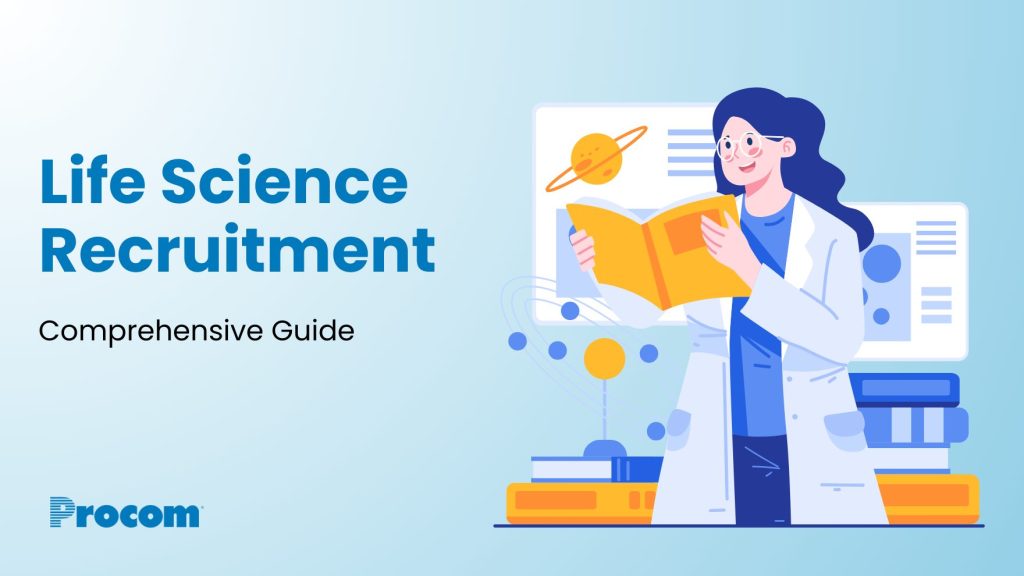The Importance of Data in Life Sciences
In the life sciences IT sector, data is increasingly becoming the cornerstone of decision-making, driving innovation, strategic planning, and enabling cutting-edge research. This increased demand for data scientists reflects the growing need for advanced analytics across the data life cycle in data science, particularly in areas like drug discovery, clinical trials, and personalized medicine.
Implementing a clear, data-driven recruitment process can significantly improve your ability to attract the right talent. This guide to life science recruitment in IT offers practical strategies for organizations—whether startups or large enterprises—to refine their hiring approach for data roles in the life sciences industry.

Key Takeaways:
- Structured Hiring: A systematic approach that prioritizes objective, data-driven decisions, focusing on recruitment metrics such as time-to-hire, cost-per-hire, diversity metrics, and skills assessments to drive outcomes in a competitive job market.
- Data-Driven Techniques: Leveraging analytics to improve hiring quality, reduce biases, and streamline the hiring process for skilled professionals.
- Essential Skills for Data Scientists: Core competencies include programming (Python, R), statistical fluency, machine learning, and visualization tools. Within life sciences IT, experience in bioinformatics, clinical data management, or regulatory compliance is particularly valued by pharmaceutical companies and medical device manufacturers.
- Promoting Diversity: A structured, unbiased hiring process fosters a diverse and innovative team environment.
Implementing a Structured Hiring Approach
To effectively recruit life science professionals for data roles, structured hiring is essential. This method improves efficiency and ensures you retain top talent capable of advancing your organization’s mission.
Key Elements of Structured Hiring:
- Job Analysis and Descriptions: Clearly define the required skills and experience for each role, focusing on the specific needs of life sciences IT, such as knowledge of regulatory environments or experience with bioinformatics tools.
- Consistent Interview Frameworks: Develop standardized interview formats that assess both technical abilities and soft skills, ensuring a balanced evaluation of each candidate.
- Assessment Tools: Utilize technical tests and structured interviews to objectively evaluate candidates’ capabilities.
- Predictive Analytics: Implement data analytics and predictive models to assess the potential performance and fit of candidates.
Benefits of Structured Hiring:
- Efficiency Gains: Streamlined processes allow you to focus on candidates who best fit the role, saving time and resources.
- Reduced Bias: Data-driven tools and structured assessments help minimize unconscious biases, leading to fairer and more inclusive hiring.
- Improved Candidate Experience: A clear and consistent hiring process provides candidates with transparency and fairness, enhancing your employer brand.
- Performance Predictability: Using data and analytics helps predict how well candidates will perform, reducing turnover and improving team quality.
- Diverse Teams: By setting clear criteria and avoiding subjective judgments, structured hiring promotes the creation of diverse teams, which enhances creativity and problem-solving.

Leveraging Data-Driven Approaches in Recruitment
Data-driven recruitment can significantly reduce bias and enhance the quality of hires by focusing on objective metrics like assessment scores, experience matching, and predictive analytics.
Eliminating Bias Through Data: Data-driven recruitment will help your organization evaluate candidates based on objective criteria, leading to more diverse and equitable hiring practices. Companies like Google and Airbnb use AI and analytics to ensure that candidates are judged on their skills rather than subjective criteria, leading to more diverse teams and fairer hiring practices.
Focusing on Relevant Factors: Data analytics allow employers to hone in on key performance indicators, such as time-to-hire and candidate fit. Tracking diversity metrics and gathering feedback from candidates helps refine the process, making it more inclusive and effective.
Implementing a Successful Data-Driven Approach: Use tools like applicant tracking systems and recruitment analytics to provide valuable insights, measure outcomes, and adapt based on emerging trends. In a field where continuous learning and technological advancements drive progress, your hiring strategy should reflect that agility.
Why Partner with Procom?
In a sector as complex and fast-moving as life sciences, securing the right talent isn’t just about filling roles—it’s about shaping what’s next. Procom partners with organizations at the forefront of life sciences innovation, offering more than transactional support. We bring a deep understanding of the intersection between science, technology, and talent—grounded in decades of life sciences recruiting experience and guided by a commitment to measurable outcomes.
As IT functions grow increasingly critical across drug development, clinical data, and compliance systems, so does the demand for specialized professionals. But in a competitive market where every hiring decision affects speed, quality, and compliance, guesswork is costly. That’s where Procom delivers: our strategic approach combines structured, data-led hiring frameworks with the in-depth industry knowledge required to spot alignment beyond a résumé.
We understand that IT roles for life sciences companies require more than just technical skills; adaptability, rigor, and a strong grasp of regulatory nuance are must-haves. With a proven track record supporting pharmaceutical, biotech, and life sciences companies, we reduce recruitment costs and hiring friction while building teams designed to scale with science.
We also bring insight into emerging industry trends, helping our partners not only find talent—but future-proof their talent acquisition strategies.
Advancing Life Sciences Careers
For professionals pursuing a life sciences career, especially those in IT and data roles, the pathway forward is rarely linear, but it’s rich with possibility. At Procom, we take pride in guiding job seekers through meaningful transitions.
We recognize that finding the right opportunity in life sciences means navigating nuance: aligning technical capabilities with purpose-driven missions, balancing innovation with compliance, and seeking roles that prioritize both impact and career development.
Whether you’re deep in your job search or just beginning to explore your next chapter, we offer personalized support, real insight, and access to exciting career opportunities.





